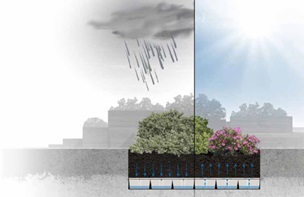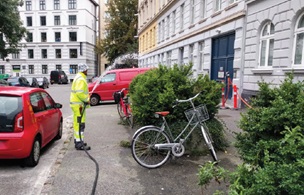Internet of Things (IoT) in smart city planters
IoT and sensors for rainwater collection measurement and automatic watering in urban green spaces and facilities.
Aqumi's background
Aqumi (previously Byland) is a Danish startup that sells a solution it developed for automatic watering of urban green spaces, planters, and facilities. Their solution combines rainwater collection with plant watering. The project started with a desire to integrate IoT sensors in their solution, so that their customers could better plan their watering.User and context study for IoT watering systems
Initially, a user study was conducted for the project in the Municipality of Frederiksberg, which is responsible for the daily watering of the municipality’s trees and planters. The study provided important insights into not only the watering workflow itself, but also the planning and other operations surrounding the watering.
As a bonus, the user and context study also revealed new concepts and domains within the fields of IoT and sensors which Aqumi may contribute solutions to in the future.


Technical requirements for Smart City watering prototype
The results of the user and context study of a potential Smart City and IoT watering system served as a framework for developing a series of technical requirements for the prototype that was to be constructed.
Examples of these requirements include:
- The sensors need to measure the level of the collected rainwater.
- The prototype must be resistant to water and other environmental factors.
- The battery life should be sufficient to provide power to the prototype for the duration of the test, lasting a minimum of 2 months.
- Sensor data must be able to be sent at least once per day, and it must be capable of being saved online.
Energy harvesting with solar cells
Energy harvesting, in which energy is gathered (or “harvested”) from the surrounding environment, is one of the areas in which IdemoLab has specialised skills. For this reason, the possibility of powering the prototype using solar cells was investigated before constructing it.
Based on the expected daily power consumption and a test of the energy that could be stored under various lighting conditions, it was decided that the prototype’s batteries would be charged using solar cells. This also provided an opportunity to test a concept that would not rely on periodic battery changes or power cables.
Aqumi’s Smart City watering system prototype
A working prototype was constructed based on the technical requirements. It fulfilled the requirements and could be installed in Aqumi’s existing solution.
The prototype was subsequently integrated into a planter installed in Frederiksberg to test its functionality in the most realistic conditions possible over a couple of months.
Results of the IoT watering system prototype test
Overall, the test proved successful. The results discovered over the course of the project and testing showed that water could be saved by measuring the water already available, allowing the solution to take rainwater into account.
With the added IoT water level sensor, an extra layer of security is present in determining whether extra watering is needed. It was also found that because of this, people can save the time they would otherwise spend watering manually, thereby also cutting down on driving time and vehicle emissions.
Regarding the test’s technical results, it was shown that during the testing period, enough energy was gathered from the solar cells to make daily measurements and upload them to an online platform, making it possible to statistically analyse water retention and power usage.
Read also: Hardware evaluation requirements - Donkey Republic
The future of Aqumi's IoT watering system
Due to this project, Aqumi was awarded support in the form of an InnoBooster to continue working on their solution with IoT watering systems. They are now working on launching their solution commercially. Learn more and follow its development at www.aqumi.dk (in Danish).Project partners
This project was financed by the nationwide IT innovation network InfinIT, in turn financed by a grant from the Danish Agency for Science and Higher Education. This project was conducted by IdemoLab, FORCE Technology, for Agumi, with contributions from DTU Management Engineering’s behavioural design department and landscaping firm A//A.


